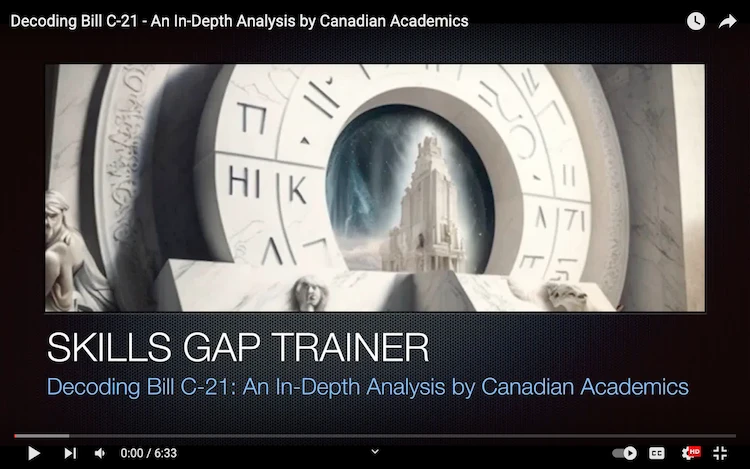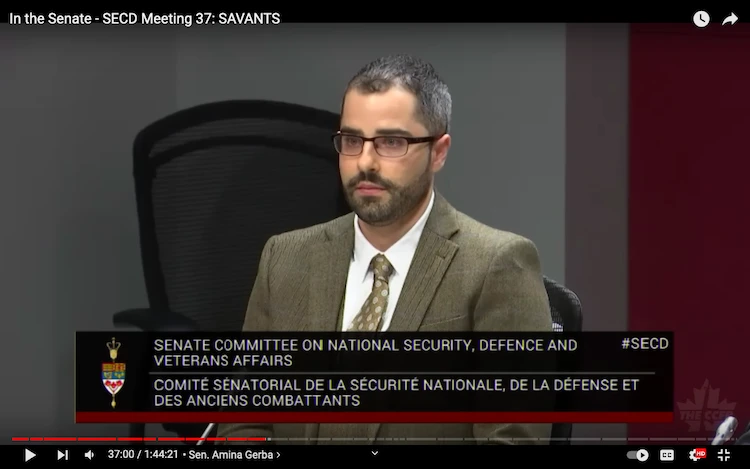Video: Decoding Bill C-21 – An In-Depth Analysis by Canadian Academics
YouTube Link: https://youtu.be/5xL-sXIt-74
@skillsgaptrainer “Recent legislative changes proposed by the Canadian government have sparked a rigorous debate that transcends the walls of academia and reaches into the lives of everyday Canadians. Bill C-21: “An Act to amend certain Acts and to make certain consequential amendments (firearms)” proposes sweeping amendments to firearms regulation, significantly impacting individual firearm owners, businesses, and law enforcement agencies.
Rising to the challenge of dissecting this complex legislative proposal, a distinguished team of Canadian academics have presented a research report offering a comprehensive analysis, providing key insights, recommendations, and critiques of Bill C-21. It is our privilege to introduce the work of several Canadian researchers, who have brought their immense academic rigour and experience to bear on this critical issue.
Bill C-21 primarily introduces stricter conditions for license eligibility, focusing on individuals with a history of domestic violence and stalking, and offers a more rigorous verification system for firearm license holders. It also aims to redefine ‘prohibited firearms’ and address the unlawful manufacture of firearms. While the supporters of the bill advocate that it will heighten public safety, this research report provides a counterpoint, highlighting potential pitfalls and negative impacts.
A key critique in the report is that the new licensing eligibility conditions might unduly penalize reformed individuals with prior convictions, running contrary to the principle of rehabilitation, which is fundamental to the Canadian justice system. Additionally, the report warns that such measures could disproportionately affect marginalized communities, including impoverished and Indigenous populations.
Another central discussion in the report revolves around the issue of ‘ghost guns’ and the unlawful manufacture of firearms. The researchers suggest that Bill C-21 does not effectively address this growing concern, urging for further in-depth study to prevent potential negative consequences for lawful firearm owners.
One of the most contentious points of the bill is the ambiguous definition of ‘prohibited firearms’ and ‘variants.’ This lack of clarity, the academics argue, could introduce unnecessary risks and uncertainty for firearm owners and manufacturers. The call to action, therefore, is for lawmakers to provide a comprehensive legal definition for these terms.
The research report concludes by advocating for a thorough review of the efficacy of Canadian firearm legislation. The team asserts that the current system is convoluted and unpredictable, and the implementation of Bill C-21 would only exacerbate this unpredictability. They emphasize the need to focus on rules that demonstrate positive impact and warn against measures that could incur negative economic, social, and legal repercussions.
Running like a thread throughout the report is the call for greater collaboration and dialogue between lawmakers and firearm owners. Echoing lessons from the history of conservation policy in North America, the researchers argue that considering firearm owners as valued partners in policy development can lead to durable compromises, aiding the government in achieving its policy goals.
Through their rigorous academic exploration, the researchers have brought important insights to the forefront, ensuring that the future of firearm regulation in Canada strikes a balance between public safety and the rights of individuals and communities. Their comprehensive, nuanced, and critical analysis of Bill C-21 serves as a reminder of the potential unintended consequences if this balance is not achieved.
We must congratulate
- Noah S. Schwartz, Ph.D., Assistant Professor of Political Science, University of the Fraser Valley
- Tim Thurley, MSc, Firearm Researcher and Policy Specialist
- Adam Jones, Ph.D., Professor of Political Science, UBC Okanagan
- Nikolai Kovalev, Ph.D., Associate Professor of Criminology, Wilfrid Laurier University
- Christian Leuprecht, Ph.D., Professor of Political Science, Royal Military College & Director, Institute of Intergovernmental Relations, School of Policy Studies, Queen’s University
- Gary Mauser, Ph.D., Professor Emeritus, Simon Fraser University
- Caillin Langmann, MD, Ph.D., Assistant Clinical Professor, Medicine, McMaster University
for their invaluable contributions to this critical discourse.
This report is the result of the collective expertise and insights of a diverse team of academics, who have lent their knowledge and understanding to unravel the complexities of the proposed legislation. Their report underlines the indispensable role of academic rigour in policy debates and offers a clear roadmap for the future of firearm regulation in Canada. For those keen on delving deeper into the report’s detailed analysis and recommendations, it can be viewed and downloaded at the bottom of this page.
These scholars’ academic rigour and commitment to evidence-based public policy have provided valuable perspectives and in-depth understanding of the proposed Bill C-21, contributing to a more informed discussion among policymakers, stakeholders, and the public. Their work epitomizes the crucial role that academia can play in shaping policies that truly reflect the diverse needs and realities of the populace. The researchers’ dedication to evidence-based public policy development, as demonstrated through their thorough analysis of Bill C-21, is a testament to the immense potential of academia in shaping legislation that impacts society at large.”
Related Content:
Video: Dr. Noah Schwartz Statement on Bill C-21 in the Senate
YouTube Link: https://youtu.be/CG1mUFnSclE?si=HeVuJmfVbeSLlRdw
Video: In the Senate – SECD Meeting 37: SAVANTS
YouTube Link: https://youtu.be/EDr_-Oi6XW4?si=Kmmh3BNZHnENG27p
Related books and resources:
“Canadian Firearms Law, Policy, and Practice” by Solomon Friedman – This book offers an in-depth look into the complexities of Canadian firearms legislation, which could provide a solid background against which to compare the proposed changes in Bill C-21.
“Policing and the Politics of Order-Making” by Randy K. Lippert – While not specifically about firearms, this book delves into the broader implications of law enforcement and policy-making in Canada, providing context that could be relevant to discussions around Bill C-21.
“The Limits of Liberty: Rights and Liberties Under the Law” by Michael Kent Curtis – This text explores the balance between individual rights and public safety, a central theme in the debate surrounding Bill C-21.
“Rethinking Gun Control: The Role and Impact of Firearms in American Society” by Alexander DeConde – Offering a comparative look, this book delves into gun control debates and policies in the United States, providing a contrasting backdrop to Canada’s legislative landscape.
“Guns, Democracy, and the Insurrectionist Idea” by Joshua Horwitz and Casey Anderson – While U.S.-focused, this book explores themes of firearms, public safety, and democracy that are also relevant to Canadian discussions on Bill C-21.
Open Letter and Research Report to the Senate of Canada from Canadian Researchers
To see our Donate Page, click https://skillsgaptrainer.com/donate
To see our Instagram Channel, click https://www.instagram.com/skillsgaptrainer/
To see some of our Udemy Courses, click SGT Udemy Page
To see our YouTube Channel, click https://www.youtube.com/@skillsgaptrainer


